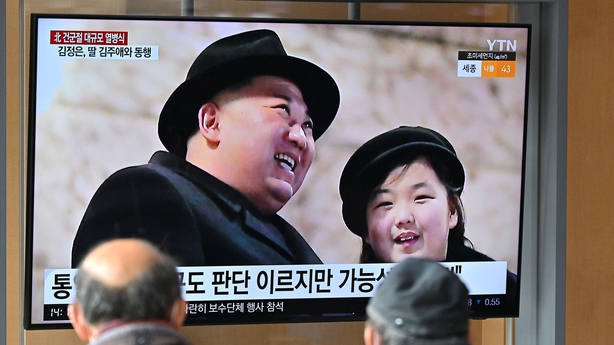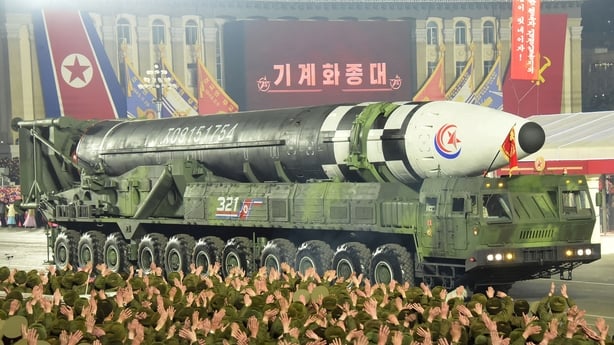Foreign ministers from the G7 group of industrialised nations have slammed North Korea's "reckless behaviour" after it fired an intercontinental ballistic missile that landed in Japan's exclusive economic zone.
It comes after Pyongyang warned of a strong response to upcoming US-South Korean military drills.
The launch, Pyongyang's first in seven weeks, comes days before Seoul and Washington are due to start joint tabletop exercises aimed at improving their response in the event of a North Korean nuclear attack.
"This act is in blatant violation of UN Security Council Resolutions, and threatens regional and international peace and security," said a G7 statement issued by Japan's Foreign Minister Hayashi Yoshimasa after talks in Munich.
"North Korea's reckless behaviour demands a unified response by the international community, including further significant measures taken by the UN Security Council."
Japan said North Korea "fired one ICBM-class ballistic missile" which flew for some 66 minutes before landing in the country's exclusive economic zone, chief government spokesman Hirokazu Matsuno told reporters.
Tokyo's defence minister Yasukazu Hamada said the missile could have had the capacity to fly 14,000 km -- which would mean it was capable of hitting anywhere on the mainland United States.

Seoul's military told AFP it had detected the launch of an ICBM, which was fired on a lofted trajectory -- up instead of out, typically done to avoid overflying neighbouring countries -- and flew some 900 kilometres.
"Detailed specifications are being closely analysed by South Korea-US intelligence authorities," it added in a statement.
South Korea's Presidential office said it held a National Security Council meeting to discuss the launch, and that its participants decided to "take stern measures against any attempts to threaten our people".
The estimated flight time of just over an hour is similar to that of the Hwasong-17 intercontinental ballistic missile Pyongyang tested last November, Seoul-based specialist site NK News reported.
The launch was "another step in the efforts of North Korea to perfect its long-range strike capabilities", Chun In-bum, a retired South Korean army general, told AFP.
"The message of North Korea is clear: we are steadily progressing with the aim to perfect long-range nuclear weapons."
The missile could have been a second successful test of a Hwasong-17, said Joseph Dempsey, a researcher at the International Institute for Strategic Studies.
He told AFP it could also have been a test of "the as yet unseen solid-fuel ICBM in development" -- a more advanced weapon Pyongyang has long aimed to add to its arsenal.
'Tit-for-tat'
Military tensions have risen on the Korean peninsula after a year in which North Korea declared itself an "irreversible" nuclear state and carried out sanctions-busting weapons tests nearly every month, including firing ICBMs.
In response, Seoul has ramped up joint military drills and cooperation with key security ally Washington, in a bid to convince the increasingly nervous South Korean public of America's commitment to deter nuclear-armed Pyongyang.
North Korea on Friday threatened an "unprecedentedly" strong response to upcoming US-South Korea drills -- which it described as preparations for war.

An Chan-il, a defector-turned-researcher who runs the World Institute for North Korea Studies, said the latest launch indicated North Korean leader Kim Jong Un "has finally pulled out his sword".
"Kim Jong Un seems to want to confront the issue with a tit-for-tat approach," he said.
The launch "can be read as a threat that Kim Jong Un is capable of attacking the US mainland with strategic nuclear weapons, not just tactical nuclear weapons".
'Solid-fuel ICBM'
South Korea's hawkish President Yoon Suk Yeol, who took office in May 2022, has vowed to get tough on North Korea.
Earlier this week, South Korea called Pyongyang its "enemy" in a defence document -- the first time in six years it has used the term, signalling a further hardening of Seoul's position.
North Korea has also ramped up its testing, including firing a ballistic missile last year that landed near South Korea's territorial waters for the first time since the end of the Korean War in 1953.
Pyongyang has repeatedly said it is not interested in further talks, and Kim Jong Un recently called for an "exponential" increase in his country's nuclear arsenal.
At a military parade in Pyongyang last week, North Korea showed off a record number of what it said were nuclear and intercontinental ballistic missiles, including what analysts said was possibly a new solid-fuelled ICBM.

North Korea has long sought to develop a solid-fuel ICBM because such missiles are easier to store and transport, as well as being more stable and quicker to prepare for launch -- and thus harder for the United States to detect and destroy preemptively.
"North Korean missile firings are often tests of technologies under development, and it will be notable if Pyongyang claims progress with a long-range solid-fuel missile," said Leif-Eric Easley, a professor at Ewha University in Seoul.

